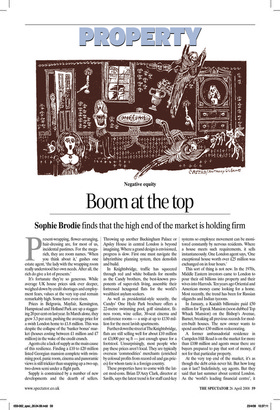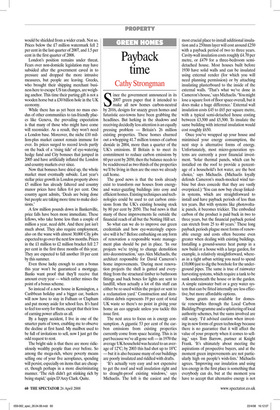Negative equity
Boom at the top
Sophie Brodie finds that the high end of the market is holding firm Present-wrapping, flower-arranging, hair-dressing are, for most of us, incidental pastimes. For the megarich, they are room names. ‘When you think about it,’ gushes one estate agent, ‘the lady with the wrapping room really understood her own needs. After all, the rich do give a lot of presents.’ It’s fortunate they’re so generous. While average UK house prices sink ever deeper, weighed down by credit shortages and employment fears, values at the very top end remain remarkably high. Some have even risen.
Prices in Belgravia, Mayfair, Kensington, Hampstead and Holland Park are up a staggering 20 per cent on last year. In March alone, they grew 3.3 per cent, pushing the average price for a swish London home to £1.8 million. This was despite the collapse of the ‘banker bonus’ market (houses costing between £1 million and £7 million) in the wake of the credit crunch.
Agents cite a lack of supply as the main cause of this resilience. Finding a £10 to £20 million listed Georgian mansion complete with swimming pool, panic room, cinema and panoramic views is still trickier than snapping up a two-up, two-down semi under a flight path.
Supply is constrained by a number of new developments and the dearth of sellers. Throwing up another Buckingham Palace or Apsley House in central London is beyond imagining. Where a grand design is envisioned, progress is slow. First one must navigate the labyrinthine planning system, then demolish and build.
In Knightsbridge, traffic has squeezed through red and white bollards for months as the Candy brothers, the best-known proponents of super-rich living, assemble their fortressed hexagonal flats for the world’s wealthiest asylum seekers.
As well as presidential-style security, the Candys’ One Hyde Park brochure offers a 22-metre swimming pool, golf simulator, fitness room, wine cellar, 30-seat cinema and conference rooms — a snip at up to £130 million for the most lavish apartments.
Further down the street at The Knightsbridge, flats are still selling well for about £10 million or £3,000 per sq ft — just enough space for a footstool. Unsurprisingly, most people who pay these prices aren’t local. They are typically overseas ‘commodities’ merchants (enriched by colossal profits from record oil and gas prices) for whom taste is a foreign country.
These properties have to come with the latest mod-cons. Brian D’Arcy Clark, director at Savills, says the latest trend is for staff card-key systems so employee movement can be monitored constantly by nervous residents. Where a house meets such requirements, it sells instantaneously. One London agent says, ‘One exceptional house worth over £25 million was exchanged on in four hours.’ This sort of thing is not new. In the 1970s, Middle Eastern investors came to London to pour their oil billions into property and their wives into Harrods. Ten years ago Oriental and American money came looking for a home. Most recently, the trend has been for Russian oligarchs and Indian tycoons.
In January, a Kazakh billionaire paid £50 million for Toprak Mansion (soon dubbed Top Whack Mansion) on the Bishop’s Avenue, Barnet, breaking all previous records for modern-built houses. The new owner wants to spend another £30 million redecorating.
A former ambassadorial residence in Campden Hill Road is on the market for more than £100 million and agents swear there are buyers prepared to pay that sort of money, if not for that particular property.
At the very top end of the market, it’s as though the debt crisis never hit. But how long can it last? Indefinitely, say agents. But they said that last summer about central London. As the ‘world’s leading financial centre’, it would be shielded from a wider crash. Not so. Prices below the £7 million watermark fell 2 per cent in the last quarter of 2007, and 1.5 per cent in the first quarter of 2008.
London’s position remains under threat. Fears over non-domicile legislation may have subsided after the government caved in to pressure and dropped the more intrusive measures, but people are leaving. Greeks, who brought their shipping merchant business here to escape US tax changes, are weighing anchor. This time their parting gift is not a wooden horse but a £30 billion hole in the UK economy.
While there has as yet been no mass exodus of other communities to tax-friendly places like Geneva, the prevailing expectation is that many of those who might have come will reconsider. As a result, they won’t need a London base. Moreover, the niche £10 million-plus market cannot remain immune for ever. Its prices surged to record levels partly on the back of a ‘rising tide’ of eye-watering hedge fund and City bonuses that jumped in 2005 and have artificially inflated the London and country markets ever since.
Now that bonuses have dried up, the whole market must eventually subside. Last year’s stellar price growth in London property above £5 million has already faltered and country manor prices have fallen 0.4 per cent. One country agent admits, ‘Deals are being done but people are taking more time to make decisions.’ A few million pounds down in Bankerville, price falls have been more immediate. These fellows, who take home less than a couple of million a year, need debt. And there just isn’t much about. They also require employment, also on the wane with almost 30,000 City jobs expected to go over the next few months. Prices in the £1 million to £2 million bracket fell 2.7 per cent in the first three months of this year. They are expected to fall another 10 per cent by this summer.
Even those lucky enough to earn a bonus this year won’t be guaranteed a mortgage. Banks want proof that they’ll receive that amount every year — which rather misses the point of a bonus scheme.
So instead of a new house in Kensington, a Caribbean holiday and a bigger car, bankers will now have to stay in Fulham or Clapham and put money aside for school fees. It’s hard to feel too sorry for them, except that their loss of earning power affects us all.
By a happy accident, I live in one of the smarter parts of town, enabling me to observe the decline at first hand. My mailbox used to be full of invitations to sell, now I just get the odd request to rent.
The bright side is that there are more ridiculously wealthy people than ever before. So among the mega-rich, where poverty means selling one of your five aeroplanes, spending will persist, especially on items that are cheaper, though perhaps in a more discriminating manner. ‘The rich didn’t get stinking rich by being stupid,’ quips D’Arcy Clark. Quite.











































































 Previous page
Previous page